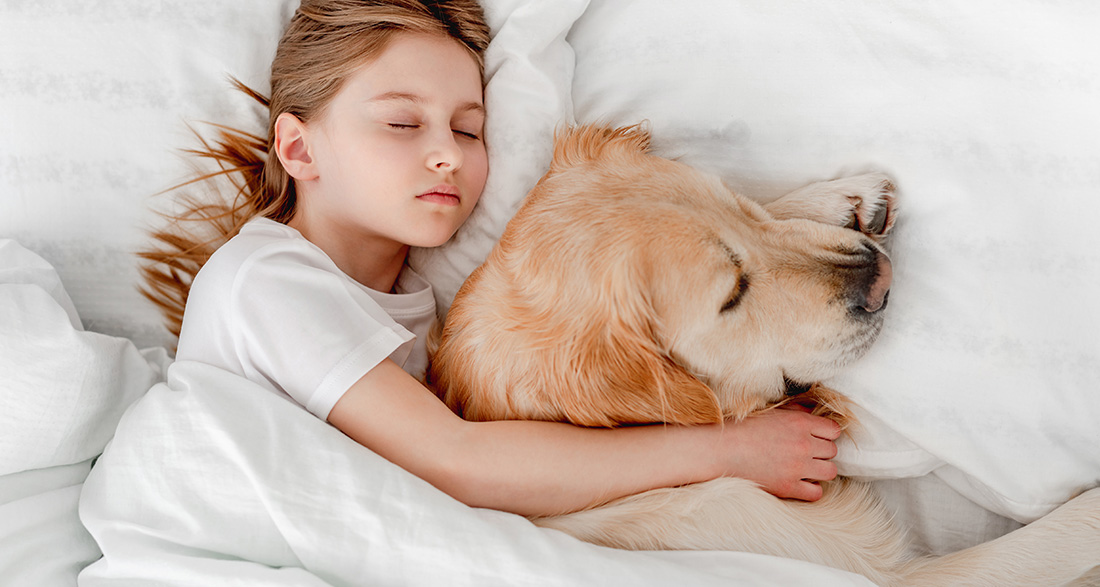For most dog owners, their four-legged companion is a family member, playmate, best friend, and cuddly companion all rolled into one. For some owners, the privilege extends to letting their dog sleep in bed with them. A survey conducted among U.S. dog owners even revealed that some people sleep better when sharing the bed with their dog instead of their human partner.
While bringing a dog into bed may be entirely normal for some, it’s considered an absolute no-go for others. The hygiene aspect, in particular, often sparks heated debates, but the comfort of sleeping also plays a role. According to a U.S. online survey, the decision, however, tends to lean towards letting the dog in bed in most cases.
Dog in Bed? Survey Reveals Interesting Results
Out of the 1000 surveyed owners, 76 percent stated that they allow their canine companion to sleep in the same bed. Surprisingly, 33 percent of married individuals reported sleeping better when only their dog shares the bed with them.
The majority of couples—specifically 56 percent—enjoy a restful night’s sleep when both their spouse and dog share the bed. Interestingly, 32 percent of surveyed married individuals expressed differing opinions on whether the canine companion should be allowed in bed.
Studies Confirm Positive Effects
A study from the Mayo Clinic in the U.S. supports the survey findings: Some people do sleep better when their dog is close to them at night. Apparently, they feel more secure and safe when they sense the presence and steady breathing of the animal.
A similar sentiment was confirmed by a 2018 U.S. study involving over 900 women. According to the study, participants felt more comfortable, protected, and less disturbed during sleep with a dog in bed compared to a human bedmate. In the US, despite concerns, around one-third of all dogs are allowed to share the bed with their owners, as per a 2013 TNS Infratest survey.
Is Having a Dog in Bed Unhygienic?
Opponents of having dogs in bed primarily argue, not entirely unfoundedly, that a dog in bed is unhygienic. However, a well-groomed, clean, and dewormed canine poses no significant hygienic threat to healthy individuals. Nevertheless, it’s crucial to regularly administer anti-worm medication to the dog and check for ticks.
Dogs shed hair, varying in amounts, which may end up in bed. These hairs can be inhaled during sleep or cause discomfort. Additionally, parasites like ticks, mites, or fleas can hide in dense or curly fur, even after thorough inspection, and may also end up in bed.
“It’s essential to consider this,” says Christina Miller, a dog trainer from Kansas, who runs a dog school, adding that having a dog in bed is not a hygienic burden for her.
“If someone wants to take their dog to bed, they can do so without worry.”
Dog in Bed – Bad for Training?
From a training perspective, it’s not an issue if the dog and owner share the same sleeping space, says dog trainer Miller. Concerns expressed by some dog owners that the canine companion might misunderstand its place in the family and see itself as “higher in rank” are dispelled by the expert.
“Allowing the dog to sleep in bed doesn’t change the relationship with humans.” A well-trained animal knows its place within the family. Moreover, the dog won’t become overly humanized by being allowed in bed, says the expert to iHugDogs.
Should Puppies Be Allowed in Bed?
Especially for young dogs, being able to lie close to their humans is often pleasant, says the dog trainer. Therefore, there are generally more reasons for than against allowing a puppy, which has just moved to a new home, into bed, at least initially.
“It’s a tough time for him, suddenly without his pack in a strange environment,” says Miller.
When the puppy is allowed to sleep in bed with its new caregivers, it feels more comfortable and secure. The animal can then gradually be accustomed to sleeping beside the bed if the owners prefer. The same applies if the dog is allowed on the sofa during a cozy TV evening.
“A well-trained dog understands perfectly that the sofa is okay but the bed is off-limits afterward,” adds Miller in a conversation with iHugDogs.
Some Dogs Don’t Want to Sleep with Humans
Even if some owners enjoy cuddling with their dogs, they should respect the animal’s wishes. “Some dogs don’t like to sleep with their humans,” says the dog trainer. “Too warm, too tight, whatever the reason—there are many reasons why a dog prefers to find another sleeping place.” Some animals don’t even want to lie in the same room as their human. On the other hand, Jack Russell Terriers are known to slip under the covers with their owners. “Owners and dogs can enjoy that without any worries,” reassures Miller.
What Speaks Against Having a Dog in Bed
Limited space, the dog’s sleeping behavior, and temperature, as a dog’s body radiates heat. While it may be pleasantly cozy in winter, it can quickly become too much for both human and animal in summer.
Moreover, dogs can snore and rarely lie still throughout the night. They may get up and change sleeping positions, scratch extensively, lick their paw, or wander around before jumping back onto the bed, not necessarily paying attention to whether they accidentally step on their owner’s legs or belly. For individuals with light sleep or a restless dog, it might be better not to bring the dog into the bedroom.


